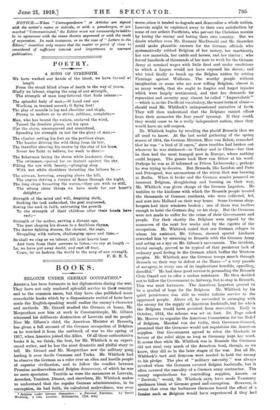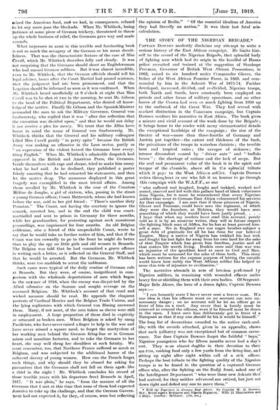BOOKS.
BELGIUM UNDER GERMAN OCCUPATION.*
Mimics has been fortunate in her diplomatists during the war. They have not only rendered splendid service to their country and to the common cause, but they have also published some remarkable books which by a dispassionate recital of facts have made the English-speaking world realize the enemy's character and methods. Mr. Gerard studied the German at home, Mr. Morgenthau saw him at work in Constantinople, Mr. Gibson witnessed his deliberate destruction of Louvain and its people. Now Mr. Gibson's chief, the American Minister at Brussels, has given a full account of the German occupation of Belgium as he watched it from the outbreak of war to the spring of 1917, when America joined the Allies. Of all these authoritative books it is, we think, the best, for Mr. Whitlock is an experi- enced writer, and he has the most dramatic and pitiful story to tell. Mr. Gerard and Mr. Morgenthau saw the military gang lording it over docile Germans and Turks. Mr. Whitlock had to observe the German as a ruler over an alien and hostile people of superior civilization, and to follow the conflict between Prussian mediaevalism and Belgian democracy, of which he was no mere spectator. Terrible as were the massacres at Louvain, Aerschot, Tamines, Dinant, and elsewhere, Mr. Whitlock makes us understand that the regular German administration, in its corruption, its bad faith, its caloulated malevolence, was even • Belgium tinder German Occupation : a Personal Narrative. By Brand Whitlock. 2 vols. London : Heinemann. [25s. net.] worse, since it tended to degrade and demoralize a whole nation. Louvain might be explained away to their own satisfaction by some of our ardent Pacificista, who pervert the Christian maxim by loving the enemy and hating their own country. But we doubt whether even Mr. Ramsay MacDonald and Mr. Snowden could make plausible excuses for the German officials who systematically robbed Belgium of her money, her machinery, her raw materials, her cattle and horses, and her timber ; who forced hundreds of thousands of her men to work for the German Army at nominal wages with little food and under conditions to which a Legree would not have exposed his slaves ; and who tried finally to break up the Belgian nation by setting Flemings against Walloons. The worthy people without imagination or sense who are now telling Belgium, almost in so many words, that she ought to forgive and forget injuries which were largely sentimental, and that her demands for reparation and security may almost be called " Imperialistic " —which is, in the Pacificist vocabulary, the worst term of abuse— should read Mr. Whitlock's unimpassioned narrative of facts. They will then understand that the Belgians cannot efface from their memories the four years' tyranny. If they could, they would cease to be a really independent nation, since they would have no self-respect.
Mr. Whitlock begins by recalling the placid Brussels that we all used to know. At the last social gathering of the spring season of 1914, the German Minister, Herr von Below, remarked that he was " a bird of ill omen," since troubles had broken out wherever he was stationed—in Turkey and in China—but that he then had the most tranquil post in Europe, where nothing could happen. The guests took Herr von Below at his word. Perhaps he was as ill informed as Prince Iichnowsky ; perhaps he was trying to deceive. But Brussels, like London and Paris and Petrograd, was unconscious of the storm that was brewing in Berlin. When it broke and the German armies pounced on innocent Belgium, slaughtering and burning on their way, Mr. Whitlock was given charge of the German Legation. Ho testifies to the kindness with which the Brussels people treated the thousands of German residents, who were collected, fed, and sent into Holland on their way home. Some German shop- keepers had their windows broken ; one of them was tactless enough to hoist the German flag on his shop. But the Germans were not made to suffer for the crime of their Government and people. For their charity the Belgians were repaid by the massacres of the next few weeks and by the rigotirs of the occupation. Mr. Whitlock noted that one German refugee to whom his assistant, Mr. Gibson, showed special kindness rewarded him by returning to Brussels with the German Army and acting as a spy on Mr. Gibson's movements. The incident, trivial enough, proved to be typical of that persistent lack of ordinary good feeling in the German which baffles the Western peoples. Mr. Whitlock saw the German troops march through Brussels on their way to defeat at the Marne—" a very parade of savagery, in every one of its implications horrible, appalling, dreadfuL" He had done good service in persuading the Brussels Civic Guard not to offer a useless resistance. He then decided not to follow the Government to Antwerp, but to stay in Brussels. This was most fortunate. The American Legation proved to be a symbol of hope for the Belgians. Mr. Whitlock by his quiet persistence was able to render infinite service to the oppressed people. Above all, he succeeded in arranging with the enemy for the supply of American foodstuffs, but for which the Belgians would have perished from starvation. Early in October, 1914, the scheme was set on foot. Dr. Page asked Mr. Hoover to organize the American Commission for the Relief of Belgium. Marshal von der Goltz, then Governor-General, promised that the Germans would not requisition the American supplies. Our Government agreed to relax the blockade in favour of the relief ships so long as Germany kept her word. It seems that while Mr. Whitlock was in Brussels the Germans did not steal very much of the American food, though, as we know, they did so in the later stages of the war. But all Mr. Whitlook's tact and firmness were needed to hold the enemy to his pledge. The plea of " military necessity " was always invoked when the Germans coveted Belgian foodstuffs, but it often covered the rascality of a German army contractor. The enemy organizations for controlling supplies, known as " Zentrale," would, Mr. Whitlock says, have made Tammany spoihmien blush at German greed and corruption. However, it seems that even the barbarous Germans feared the effect of a famine such as Belgium would have experienced if they had
seized the American food, and- we had, in consequence, refused to let any more pass the blockade. When Mr. Whitlock, losing patience at some piece of German trickery, threatened to throw up the whole business of relief, the Germans gave way and made amends. •
What impresses us most in this terrible and fascinating book is not so much the savagery of the German as his mean deceit- fulness. That was the characteristic feature of the case of Miss Cavell, which Mr. Whitlock describes fully and clearly. It was not surprising that the Germans should shoot an Englishwoman who had nursed German soldiers. But it was almost incredible, even to Mr. Whitlock, that the German officials should tell his legal adviser, hours after the Court Martial had passed sentence, that the judgment had no: been pronounced, and that the Legation should be informed as soon as it was confirmed. When Mr. Whitlock heard unofficially at 9 o'clock at night that Miss Cavell was to be shot at two in the morning, he sent Mr. Gibson to the head of the Political Department, who denied all know- ledge of the matter. Finally Mr. Gibson and the Spanish Minister persuaded the man to ask the Military Governor, General von Sauberzweig, who replied that it was " after due reflection that the execution was decided upon," and that he would not delay it nor receive a plea for mercy. We trust that the Allies have borne in mind the name of General von Sauberzweig. Mr. Whitlock thinks that the General and his military colleagues l illed Miss Cavell partly " in petty spite " because the British Army was making an offensive in the Loos sector, partly as " an expression of the violent hatred the Germans bore every- thing English." When Mr. Whitlock's admirable despatch had appeared in the British and American Press, the Germans, beside themselves with rage and shame, tried to make him unsay what he had said. As he declined, they published a poster falsely asserting that he had retracted his statements, and then let the matter drop. The meanness displayed in this great tragedy was exemplified in the most trivial affairs. Among those recalled by Mr. Whitlock is the case of the Countess 1161One de Jongho, a girl of sixteen, who, passing in the street A young German officer, Count Metternich, whom she had known before the war, said to her girl friend : " There's another dirty Prussian." The Count, not having the courtesy to ignore the remark, arrested her, and in the end the child was court- martialled and sent to prison in Germany for three months, while her grandmother, for protesting against such monstrous proceedffigs, was imprisoned for four months. An old Belgian nobleman, also a friend of this unspeakable Count, wrote to say that he would take no further notice of him, and that if the t'ount was too cowardly to go to the front he might do better than to play the spy on little girls and old women in Brussels. The Belgian was told that he had committed a grave offence in writing such a letter, as it reflected on the General Staff, and that he would be arrested. But the Germans, Mr. Whitlock thinks, were too snobbish to arrest the nobleman.
Such cases were typical of the daily routine of German rule at Brussels. But they were, of course, insignificant in com- parison with the wholesale deportations of men which began in the sustmer of 1916, when the enemy was disquieted by the Allied offensive on the Somme and sought revenge on the unarmed Belgians. Mr. Whitlock's account of that cruel and wicked measure should be read. He appends the eloquent protests of Cardinal Mercier and the Belgian Trade Unions, and the lying sophistries with which General von Biasing answered them. Many, if not most, of the men taken as slaves were still in employment. A large proportion of them died in captivity or returned as broken men. When Belgium is asked by smug Pacificists, who have never raised a finger to help in the war and have never missed a square meal, to forget the martyrdom of her working men behind the German firing-line or in German mines and munition factories, and to take the Germans to her heart, she may well shrug her shoulders at such fatuity. We must remember, too, that Northern France suffered as much as Belgium, and was subjected to the additional horror of the enforced slavery of young women. How can the French forget such things, and why should they be abused for asking for guarantees that the Germans shall not fall on them agaki lime a thief in the night ? Mr. Whitlock concludes his record of these terrible years with his departure front Brussels in April, 1917. It was plain," he says, " from the manner of all the Germans that I met at this time that none of them had expected America to take up the challenge, and that the German Govern. sent had not expected it, for they, of course, were but reflecting the opinion of Berlin." " Of the essential idealism of America they had literally no notion." It was their last fatal mis- calculation.







































 Previous page
Previous page